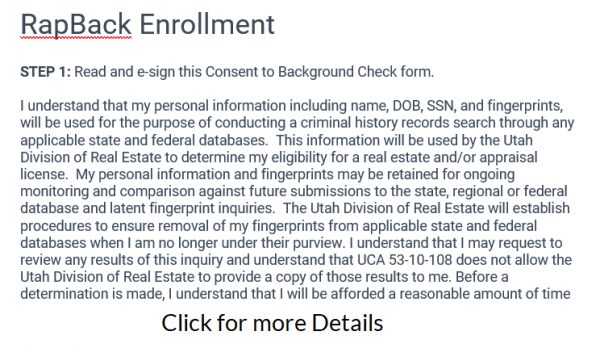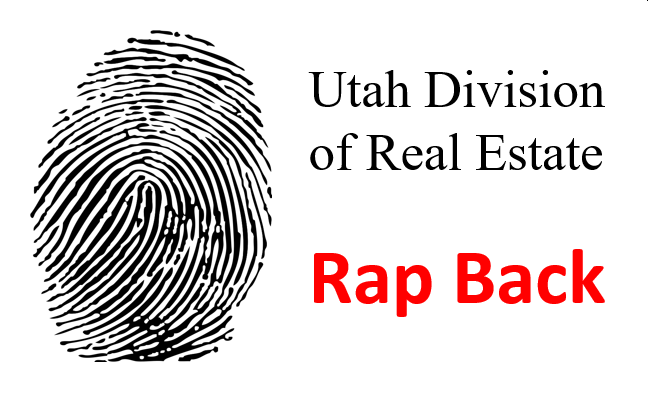Here in Utah we have a strong desire to not only live our best life, but to raise the standard for everyone else. We want the work we do, the industries we work in, to have standards as high as our own. We’ll explain the new RAP BACK program, and go into detail about how every broker and agent can fulfill this requirement that is now in effect.
The Utah Division of Real Estate has one of the hardest jobs in the state. They need to herd 25,000 independent contractors sown the narrow path of legal, and ethical representation. And while 90% of working professionals do hold strong moral standards, and try to be upright individuals, the fact of the industry is that every single representation is a potential conflict of interest. A real estate agent working to make a living is not the same goal as a homebuyer trying to be protected while they find a new home for their family. Luckily there is a lot of overlap there, but we do need a strong character as agents and brokers to continually put the needs and financial well being of our clients above our own.
What is Rap Back?
How does the Division of Real Estate determine if a broker or agent is fit to serve in this position of representing homebuyers in the biggest financial decision of their lives? They try to remove as much subjectivity as they can, and rely solely on objective measurements. Utah law does outline fiduciary responsibilities that licensees need to follow, and they also list requirements to maintain that real estate license which allows agents and brokers to legally represent their clients in real estate transactions. One of those requirements is to get continuing education hours every year, or in the literal case of Utah real estate continuing education, every 2 years. And this is on top of the sales agent pre-license course that all new agents are required to take. What’s another way that the Division can be objective about a licensees qualifications?
Criminal history, or in other words, record of when a person has violated the laws, is another way that the Division can gauge whether a person is eligible for a real estate license, or whether an existing licensee should keep their license. The Division already does background checks on everyone that applies for a real estate license. However, due to privacy laws, they have destroyed all previous fingerprint records after performing the license application process. So what happens if a licensee is convicted of a crime after that? There are rules in place that a licensee must disclose to the Division if they have any new criminal convictions, but that is only enforceable so far as the Division discovers the convictions, and if they are in other states, this can become difficult. So why don’t they have a large online database where any new criminal conviction can be found and reported?
This is where Rap Back comes in. Rap Back is the Federal Bureau of Investigation Next Generation Identification System, which ties together many different criminal databases across the country, in order for them to work together, to further the aims of the law enforcement agencies in many different states. In laymen’s terms this is big criminal database that we all thought already existed, because of TV and movies. If it’s such an obvious idea, why didn’t it come together sooner?
Privacy is a big concern for many citizens of the US, and criminal history is a hot button issue with some wanting to keep it completely private, and others arguing that it should be available for consideration when an individual applies for certain positions. In the case of individual citizens, privacy should be a high priority for our government. When you get licensed from a state agency to perform a task, you are no longer just a private citizen doing private things. A licensed real estate professional has agreed to follow the laws about agency and fiduciary to their clients, and therefore can be held to a higher standard. Part of that standard, is to be worthy of trust, and criminal history falls into that category.
In 2019 the Utah legislature passed S.B. 140 which requires that all real estate licensees be enrolled in Rap Back. This will allow the Division of Real Estate to get real time updates for any of our licensees, if they get any new criminal convictions. What about privacy, you ask? The agreement they have you sign for Rap Back states that if you were to cancel your real estate license, they would do everything they can to remove your information from the systems they work with. They are only interested in tracking brokers and agents, and making sure they live up to the legal requirements to represent clients ethically in the sale of real estate. Once you are no longer a licensee, they will respect your privacy.
What is the Utah Rap Back Requirement?
In Utah, as of January 1, 2020, all brokers and agents that renew their license must enroll in the new Rap Back system. That process was put on hold in April of 2020 because of the COVID concerns that arose at that time, but as of July 1, 2021 the Rap Back enrollments have started up again.
All brokers and agents that renew their license need to enroll in Rap Back.
There is a $40 processing fee, and a $5 enrollment fee, which adds $45 to any regular renewal fees for your real estate license. This is a one time fee, as long as you maintain your real estate license on active status. Due to privacy reasons, if you inactivate your license, or do not renew on time and allow it to expire, the Division will have to remove you from the Rap Back system, and you will have to get fingerprinted, and pay the enrollment fee again when you reactivate. So be sure to renew you real estate license on time!
Licensees need to wait until 45 days before they renew. There are costs associated with enrolling licensees in the Rap Back system, and the Division of Real Estate is spreading that cost over the course of 2 years, to avoid the need to collect and disperse a lump sum of money. Don’t get fingerprinted before that 45-day period. However, there could be some delays with fingerprint processing, so you should get fingerprinted early in that 45-day period to ensure you can renew on time. If you get fingerprinted in a location that uses paper cards instead of electronic submission, then you may have to wait up to 30 days for the fingerprint processing.
Where can you get fingerprinted? The primary locations to get fingerprinted are the Division of Real Estate office in downtown SLC, or in St George at the Division of Professional Licensing. These are the main places that you can get electronic fingerprints done, which only have a 5-day processing time. That is much more convenient than waiting for paper cards. Up in Ogden, the Northern Wasatch Association of Realtors is also available. If you can’t go to one of these locations, then most any local police station, and some school districts have fingerprinting capabilities.
How do I enroll in Rap Back and Renew My License?
Step 1 – Sign the consent form on the Division of Real Estate Website, and print the Authorization Form.
You can find it under the Rap Back link on the main site, which takes you here:
Here is an example of what the agreement might look like that you will be asked to electronically sign:

You will need to bring the printed Authorization form with you to get your fingerprints done correctly!
Step 2 – Get fingerprinted at an authorized location.
You will need to bring:
- The printed Authorization Form that you got when you agreed to Rap Back on the Division Website. Click Here to see what it will look like.
- Your Real Estate License. Do you have a printed copy of your real estate license? Goto RELMS and print one to take with you.
- Driver’s License. They need photo ID to verify whose fingerprints they are getting.
Schedule your fingerprint appointment. Some vendors might be able to take walk-ins, but most require that you schedule in advance. These are a list of probable electronic fingerprint vendors that can submit your fingerprints within 5 days:

Click HERE for a list of possible vendors that do paper fingerprint cards, which may take up to 30 days to process.
If you get paper fingerprint cards, you will need to either mail them into the Division of Real Estate, or deliver them in person. You can deliver them to the office here:
Heber M. Wells Building
Utah Division of Real Estate, 2nd Floor
160 E 300 S
Salt Lake City UT 84111
Or you can mail them here:
Utah Division of Real Estate
PO Box 146711
Salt Lake City UT 84114-6711
Step 3 – Wait!
You need to wait for your fingerprints to process. This will take about 5 days if you did it electronically, or up to 30 days if you did it on paper fingerprint cards.
This is a great time to verify that you have all the required continuing education so that you can renew your real estate license. You can verify your continuing education credits on the state RELMS system. All agents need:
- 3 Hour Mandatory Course (residential, commercial, or property management, any one)
- 6 Additional hours CORE courses
- 9 Additional hours of Elective or CORE courses
If you are a new agent, and this is your first renewal, you will need to take the 12 Hour New Agent Course, which will qualify for all of your CORE requirements, and some of your Elective requirements.
The total CE required is 18 Hours.
Step 4 – Renew your license online through RELMS.
If your fingerprints have been processed, and you have all of your required continuing education, then you can now renew your real estate license through RELMS. Sign in, follow the links to renew, and pay the renewal fee, plus the Rap Back enrollment fee.

The renewal fee for Sales Agents is $60, for Brokers is $66. All licensees pay $5 for RAP Back on this renewal, plus a $40 background check once. After you are enrolled in RAP Back, you will not need to pay the RAP Back or background check again.
You are done!
We appreciate all the work that the Division of Real Estate staff, and the Real Estate Commission have done to help make this a smooth process. You can read more about Rap Back on their FAQ here:

